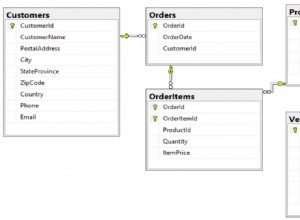- Se si verificano errori con cx_Oracle, probabilmente è meglio registrarli in un file di testo.
- Potresti provare a reindirizzare sys.stdout e sys.stderr a oggetti simili a file che registrano tutto ciò che viene scritto su un logger.
- Immagino che tu voglia impegnarti dopo ogni evento, a meno che tu non abbia valide ragioni per non farlo. In alternativa, puoi bufferizzare diversi eventi e scriverli tutti in un'unica transazione ogni tanto.
- Di seguito è riportato un esempio che utilizza mx.ODBC, probabilmente puoi adattarlo a cx_Oracle senza troppi problemi. Penso che sia conforme a Python DB-API 2.0.
La distribuzione di registrazione Python standalone (prima che la registrazione fosse aggiunta a Python) è su https://www.red-dove.com/python_logging.html e sebbene il pacchetto di registrazione in Python sia molto più aggiornato, la distribuzione standalone contiene un test directory che contiene molti esempi utili di classi di gestori derivate.
#!/usr/bin/env python
#
# Copyright 2001-2009 by Vinay Sajip. All Rights Reserved.
#
# Permission to use, copy, modify, and distribute this software and its
# documentation for any purpose and without fee is hereby granted,
# provided that the above copyright notice appear in all copies and that
# both that copyright notice and this permission notice appear in
# supporting documentation, and that the name of Vinay Sajip
# not be used in advertising or publicity pertaining to distribution
# of the software without specific, written prior permission.
# VINAY SAJIP DISCLAIMS ALL WARRANTIES WITH REGARD TO THIS SOFTWARE, INCLUDING
# ALL IMPLIED WARRANTIES OF MERCHANTABILITY AND FITNESS. IN NO EVENT SHALL
# VINAY SAJIP BE LIABLE FOR ANY SPECIAL, INDIRECT OR CONSEQUENTIAL DAMAGES OR
# ANY DAMAGES WHATSOEVER RESULTING FROM LOSS OF USE, DATA OR PROFITS, WHETHER
# IN AN ACTION OF CONTRACT, NEGLIGENCE OR OTHER TORTIOUS ACTION, ARISING OUT
# OF OR IN CONNECTION WITH THE USE OR PERFORMANCE OF THIS SOFTWARE.
#
# This file is part of the standalone Python logging distribution. See
# https://www.red-dove.com/python_logging.html
#
"""
A test harness for the logging module. An example handler - DBHandler -
which writes to an Python DB API 2.0 data source. You'll need to set this
source up before you run the test.
Copyright (C) 2001-2009 Vinay Sajip. All Rights Reserved.
"""
import sys, string, time, logging
class DBHandler(logging.Handler):
def __init__(self, dsn, uid='', pwd=''):
logging.Handler.__init__(self)
import mx.ODBC.Windows
self.dsn = dsn
self.uid = uid
self.pwd = pwd
self.conn = mx.ODBC.Windows.connect(self.dsn, self.uid, self.pwd)
self.SQL = """INSERT INTO Events (
Created,
RelativeCreated,
Name,
LogLevel,
LevelText,
Message,
Filename,
Pathname,
Lineno,
Milliseconds,
Exception,
Thread
)
VALUES (
%(dbtime)s,
%(relativeCreated)d,
'%(name)s',
%(levelno)d,
'%(levelname)s',
'%(message)s',
'%(filename)s',
'%(pathname)s',
%(lineno)d,
%(msecs)d,
'%(exc_text)s',
'%(thread)s'
);
"""
self.cursor = self.conn.cursor()
def formatDBTime(self, record):
record.dbtime = time.strftime("#%m/%d/%Y#", time.localtime(record.created))
def emit(self, record):
try:
#use default formatting
self.format(record)
#now set the database time up
self.formatDBTime(record)
if record.exc_info:
record.exc_text = logging._defaultFormatter.formatException(record.exc_info)
else:
record.exc_text = ""
sql = self.SQL % record.__dict__
self.cursor.execute(sql)
self.conn.commit()
except:
import traceback
ei = sys.exc_info()
traceback.print_exception(ei[0], ei[1], ei[2], None, sys.stderr)
del ei
def close(self):
self.cursor.close()
self.conn.close()
logging.Handler.close(self)
dh = DBHandler('Logging')
logger = logging.getLogger("")
logger.setLevel(logging.DEBUG)
logger.addHandler(dh)
logger.info("Jackdaws love my big %s of %s", "sphinx", "quartz")
logger.debug("Pack my %s with five dozen %s", "box", "liquor jugs")
try:
import math
math.exp(1000)
except:
logger.exception("Problem with %s", "math.exp")




